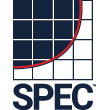SPEC CPU2000 Press Release
Date: December 30, 1999
SPEC Releases CPU2000 Benchmarks
New applications set standard for evaluating computer performance
Manassas, VA, December 30, 1999 -- The Standard Performance Evaluation
Corp. (SPEC) today released SPEC CPU2000, the latest version of the
recognized standard for evaluating computer system performance. SPEC
CPU2000 was developed by SPEC's Open Systems Group (OSG), which
includes more than 30 computer vendors, systems integrators, publishers and
consultants from throughout the world. The new application-based benchmarks
can be used across several versions of UNIX and Microsoft NT.
"Computer systems technology evolves so rapidly that we must provide
new benchmark suites to ensure a level playing field," says Kaivalya
M. Dixit, SPEC president. "SPEC CPU95 was a great success, but
it's time to make the transition to standardized benchmarks that
reflect the advances in microprocessor technologies, compilers and
applications that have taken place over the last five years; those
benchmarks constitute SPEC CPU2000."
Longer Run Times, Larger Problems
SPEC CPU2000 comprises two sets (or suites) of benchmarks: CINT2000 for
measuring compute-intensive integer performance, and CFP2000 for
compute-intensive floating point performance. The two suites measure the
performance of a computer's processor, memory architecture and
compiler. Improvements to the new suites include longer run times and
larger problems for benchmarks, more application diversity, greater ease of
use, and standard development platforms that will allow SPEC to produce
additional releases for other operating systems.
SPEC CPU2000 benchmarks were selected from application and source codes
running across multiple platforms. Seventeen (17) of the 26 benchmarks
resulted from SPEC's search campaign that offered the general public
rewards up to $5,000 for application codes and datasets. Each benchmark was
tested on different platforms to determine if it was portable, relevant and
suitable for the final SPEC CPU2000 suite.
SPEC CPU2000 is the fourth major version of the SPEC CPU benchmark suites,
which in 1989 became the first widely accepted standard for comparing
compute-intensive performance across various architectures. The new release
replaces SPEC CPU95, which will be gradually phased out between now and
July 2000, when SPEC will stop publishing CPU95 results. Performance
results from CPU2000 cannot be compared to those from CPU95, since new
benchmarks have been added and existing ones changed.
The Metrics for Measurement
SPEC CPU2000 incorporates run and reporting rules that permit both
baseline and optimized results for the CINT2000 and CFP2000 suites. The
baseline rules restrict the number of compiler optimizations that can be
used for performance testing and are mandatory for all reported results;
reporting of optimized results is optional.
SPEC CPU2000 provides performance measurements for system speed and
throughput. The speed metric, SPECint2000, measures how fast a machine
completes running all of the CPU2000 benchmarks. The throughput metric,
SPECint_rate2000, measures how many tasks a computer can complete in a
given amount of time. SPEC CPU2000 has been designed to measure throughput
for single-processor, symmetric-multiprocessor, and cluster systems.
The CINT2000 suite comprises 12 application-based benchmarks written in C
and C++ languages. Fourteen (14) CPU-intensive benchmarks written in
FORTRAN (77 and 90) and C languages are included in the floating-point
benchmarks, known as the CFP2000 suite.
SPEC selected the Sun Microsystems Ultra5_10 workstation with a 300-MHz
SPARC processor and 256-MB of memory as a reference machine. All benchmark
results are computed as ratios against the reference machine, which has a
SPECint2000 and SPECfp2000 score of 100. Each benchmark was run and
measured on the Ultra5_10 to establish a reference time.
Vendor Reporting
Initial SPEC CPU2000 results are available now at the SPEC web site, http://www.spec.org/osg/cpu2000. Additional results
will be reported starting in February 2000. SPEC member companies have been
encouraged to report CPU2000 results on older platforms to provide a
historical perspective for the new results.
Availability
SPEC CPU2000 (CINT2000 and CFP2000) is available now on CD-ROM from SPEC.
The cost is $500 for new customers and $250 for current licensees.
Universities can acquire the product for $125.
SPEC is a non-profit corporation formed to establish, maintain and endorse
a standardized set of relevant benchmarks that can be applied to the newest
generation of high-performance computers. SPEC member groups include the
Open Systems Group (OSG), the High Performance Group (HPG); and the
Graphics Performance Characterization (GPC) Group. The membership consists
of leading computer hardware and software vendors, universities and
research facilities. For more information or to order SPEC CPU2000, contact
Dianne Rice, SPEC, 10754 Ambassador Drive, Ste. 201, Manassas, VA 20109;
tel: 703-331-0180; fax: 703-331-0181; e-mail: info@spec.org or http://www.spec.org.
Additional information, including answers to frequently asked questions
about SPEC CPU2000 and the latest benchmark results, is available at http://www.spec.org/osg/cpu2000.
Press contacts:
Bob Cramblitt or Ellen Gooch
Cramblitt & Company
919-481-4599; cramco@cramco.com




